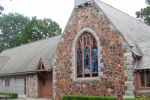March 2020
Beyond the Red Doors
Credit Unions for Economic Justice
“Banking” might not be among first things that come to mind when you think of how best to serve your community, but perhaps it should. After all, nearly everyone with whom you share a pew, (the rest of the world, too) requires the services of a financial institution. We all need bank accounts, debit cards, auto loans, online bill pay and financial literacy guidance, don’t we?
Founded in the wake of the 1992 Rodney King Riots, the Episcopal Community Federal Credit Union received its federal charter in 1994 with the support of many volunteers from parishes around the diocese. This effort was spearheaded by the bishops and clergy of the Episcopal Diocese in Los Angeles and Dr. Gloria Brown, an employee of the Episcopal Church (TEC) at that time.
Dr. Brown’s vision for the church always included economic justice. She believed that providing a path to a strong financial base offered meaningful assistance to individuals and families who were marginalized in their communities. She understood how a financial institution that provided checking and savings accounts and much needed loans in a respectful environment that considered people’s overall well-being and other financial needs could impact the quality of life – and not just for credit union members, but for the community at large.
A faith-based credit union for LA’s low and moderate income communities
Following in the footsteps of other small faith-based credit unions throughout the country, the Episcopal Community Federal Credit Union (ECFCU) opened in 1994 with a $300,000 grant received by the Diocese of Los Angeles to assist in rebuilding after the riots. It was hoped that the credit union would replace the unscrupulous check-cashing vendors, pawnshops, liquor stores and payday lenders that had set up shop after the big banks left town following the riots.
As a faith-based credit union, located at the Episcopal Diocese of Los Angeles, we serve a low- and moderate-income community that believes in the principle of service to others and investing responsibly in its communities. This philosophy follows the credit union principle where members pool their savings to make loans to one another and are shareholders of the institution where they save, borrow and obtain financial services. John H. Taylor, Bishop of Los Angeles, notes, “We can all tell from the media and politics that our society isn’t yet an equal-opportunity distributor of economic opportunity. Our credit union began and persists as a ministry of economic justice, enabling individuals and institutions to lay hands on some vital capital to leverage a better future when other lenders pass them by.”
Credit Unions are nonprofit organizations and depend on interest from loans and investments to survive. Federal regulations require that they maintain seven percent capital reserve for every dollar on deposit, meaning that every credit union must have at least that amount of money available. Even in a large metropolitan area like Los Angeles, our credit union is currently 5.6 million in assets and is barely at 7.84%. This of course, poses its own set of challenges. A financial institution that is not flush with money, must carefully consider how it invests its own resources as it continues to grow and support its members.
Access to quality banking products and services
“A hallmark of our Credit Union” says Suffragan Bishop Diane M. Jardine Bruce, “is the access it provides to its members to quality banking products, as well as loans at an extremely reasonable price. I know of many who have received loans from our Credit Union when they would have not been able to at a larger institution. This great blessing has made a strong impact in our community, especially among our most economically challenged members.”
Currently, our credit union provides an abundance of services, including:
- For members opening their first account or who need financial counseling, low-cost financial services in a supportive, compassionate, bilingual environment with fee-free, direct-deposit checking accounts and co-op debit cards
- Support for local entrepreneurs in the form of small business loans and loans to churches to assist with much-needed repairs
- An extension of our Social Justice Ministries, the credit union enables members with well-established banking records to help support others in the community as they build a more financially sustainable future
- Support for clergy and particularly those new to the country in establishing credit and providing savings, checking and debit cards
Serving the community today and tomorrow
One of the biggest challenges faced by credit unions our size is the rapid advancement of technology in the banking industry. Many of those who would be best served by our services, as well as those who are most well-equipped to provide stable accounts, have grown up with a device in their hand. If it can’t be done on a phone, it can’t be done. For a small credit union, investing in technology overhauls is daunting. The investment isn’t just an expense that isn’t in the budget (because it isn’t), it’s a new way of thinking, a new way of serving, a new way of believing in your mission.
But if your mission, like ours, has always been focused on serving your community, then finding a way forward isn’t really choice. It’s a calling. The services provided by the credit union are fundamental to people’s everyday lives. Because we are designated as a low-income credit union, we can provide services to people when other financial institutions cannot. In providing financial tools and knowledge to individuals and families, we give them power – the power to turn down high interest loans, the power to file their taxes safely, the power to buy a car, the power to share that knowledge with another.
Inspired daily by our members, we are currently evaluating their needs for tomorrow, and how we can be best suited to meet them. Technology won’t solve all our problems. There is no substitution for a warm smile, some kind conversation and a candy to go. But mobile solutions do make a whole lot of sense for generations whose primary communication tool is a tiny computer they hold in their hand.
Getting there isn’t easy. We are eager to keep our identity as a local community financial center while expanding our reach, providing our neighbors, clergy and churches with opportunities to grow in financial strength and to pass that knowledge along in their own community. We want our larger Episcopal community – which includes anyone who participates in any program of the Episcopal Church – to have the opportunity to participate in low interest lending, social justice banking and feel-good funding.
By putting our resources in the right places, namely functional in-demand technology, smart marketing and, as always, devoted staff, we intend to continue to serve the southern California counties of Los Angeles, Santa Barbara, Ventura, San Bernardino, Riverside, Orange and beyond with love and faithfulness.
A follow-up note on the novel coronavirus
With heavy hearts, the staff and Board of the Episcopal Community Federal Credit Union have considered the impact of COVID-19 on our members, our churches, our community and our own staff members. We have assured our members that we remain open and available for regular banking services, both in-person (appropriately socially-distanced) and remote, and that we will also consider long-term relief for them as the crisis continues.
The Credit Union has also set up an emergency cash fund to assist churches and other institutions of the diocese whose cash flow has been adversely impacted by circumstances created by the COVID-19 pandemic and will offer, for a limited time, a 50 percent reduction to the published rate for church loans. These loans will be used to assist in meeting payroll, utility bills or any other expense needed to keep our churches operational.
Click here for a list of Covid-19 resources on ECF Vital Practices.
Jennifer Miramontes is member of the Board of the Episcopal Community Federal Credit Union. She is the Director of E-Learning for Total CSR, a practical e-learning insurance training company. Jennifer resides with her husband and children in Ladera Ranch, California, and attends St. John Chrysostom Episcopal Church in Rancho Santa Margarita, where she serves as head lector and sits on the gratitude committee.
Resources:
- Testing Mammon: Learning Financial Discipleship by Steven Tomlinson, Vestry Papers, May 2017
- Finance Resource Guide Tools and Resources an ECF Vital Practices tool
- Facing Financial Adversity by Mary Sulerud, Vestry Papers, November 2003






